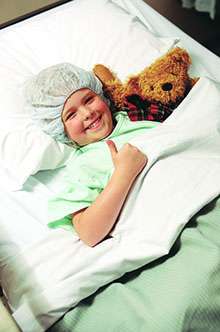The Day Before Surgery
The Day Before Surgery

The day before your child's surgery is the time to make sure all plans are in order. It can feel overwhelming, especially if having surgery is a new experience. Make sure that you have the support you need. Consider asking a family member or friend to help on this day.
Your child’s doctor may have instructions specific to your child's surgery or procedure. It is important to follow these instructions. Make sure to ask questions if anything is confusing. On the morning of the surgery, you will have the opportunity to meet your child’s anesthesiologist and have all of your questions about anesthesia answered. In some cases, the anesthesiologist will call you the night before.
Getting an Arrival Time
Before 4 p.m. on the business day before your child’s surgery, a nurse from the Preoperative Evaluation and Planning Center (PEPC) will call you. The nurse will tell you the time to report to the Admissions Office on the day of your child’s surgery. If you do not receive a call by 4 p.m., please call the appropriate number below as soon as possible. (If surgery is on a Monday, the nurse will call you on Friday.)
- Ronald Reagan UCLA Medical Center:
- Ronald Reagan Ambulatory Surgery Center:
- UCLA Santa Monica Medical Center: or
- Ambulatory Surgery Center, Santa Monica:
We offer Interpreter Services for you and your family at no cost. Please notify the preoperative staff before your child’s surgery if you will need an interpreter. We make every attempt to provide services in any language via in-person, video conference or phone.
Evaluate Your Child’s Health
We want your child to be as healthy as possible before surgery or any procedure requiring anesthesia. Make sure to tell your child’s doctor immediately if your child has:
- Been in contact with anyone with an infectious disease (example: measles or chickenpox)
- Been ill or has experienced any of these symptoms within the past two weeks: fever, cough, runny nose, sore throat, nausea or diarrhea
- Had any change in their usual health, such as sleeping more than usual or not feeling as energetic or playful as normal
- Taken any aspirin or ibuprofen within the past three days
Follow Eating and Drinking Restrictions
Our Pediatric Perioperative Surgical Home (PPSH) has devised thorough guidelines for all pediatric patients to follow, including specific eating and drinking restrictions. These eating and drinking restrictions are in place to keep your child safe during the surgery or procedure and should be strictly followed. Talk to your doctor if you have questions and follow any additional, special instructions given to you for your child.
What to Pack for Your Child’s Surgery
Make sure you bring all of the forms you were asked to fill out by your doctor and any pertinent medical records. You should also bring insurance cards or any medical assistance information.
What you pack for your child's surgery will depend on if your child is staying in the hospital overnight, and if so, for how long. It also depends on his/her age and personality. You may need to pack items for yourself as well. PPSH has come up with a useful resource to help you pack, including age-specific instructions. See our guidelines on what to bring to the hospital.
What to Read Next
Read about checking into surgery.